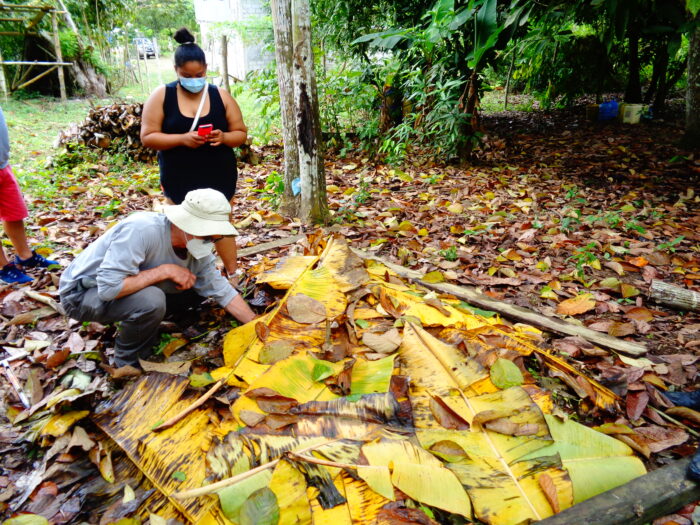 Practicing climate-smart agriculture is pivotal in allowing farmers to generate profits without causing damage to the environment. For cacao farmers in Latin America, this commitment to sustainable practices often means becoming organic certified, using organic fertilizers to improve soil health and implementing integrated pest management practices to combat the spread of diseases.
Practicing climate-smart agriculture is pivotal in allowing farmers to generate profits without causing damage to the environment. For cacao farmers in Latin America, this commitment to sustainable practices often means becoming organic certified, using organic fertilizers to improve soil health and implementing integrated pest management practices to combat the spread of diseases.
NCBA CLUSA’s USAID-funded Farmer-to-Farmer program has been recruiting volunteers for both virtual and in-person assignments in Ecuador, Peru, Honduras, and El Salvador since 2018. Since then, the program has completed 24 environmentally sustainable assignments, 10 of these assignments have focused on organic production and certification.
Organic certification allows indigenous groups to utilize traditional farming practices and comply with ancestral agroforestry systems while also remaining competitive in international markets. The Asociación de Productores Orgánicos De Cacao del Cantón Atacames – APROCA is a prime example of the dedication and training needed by farmers and producers to achieve organic certification.
APROCA was established in 2005 in the Esmeraldas province of Ecuador. The association was created to support small scale cacao farmers in the region and strengthen the cacao production chain. APROCA’s mission is to improve its members’ quality of life through income from technical support, production, and fair group marketing of quality cocoa. By becoming organic certified, they can improve their organic production so farmers can have higher revenues from their products.
In October 2021, NCBA CLUSA’s USAID-funded Farmer-to-Farmer program sent volunteer Carl Crozier to APROCA to support the association in learning how to incorporate biofertilizers into their farming practices. Carl is a former Peace Corps volunteer with experience working in Honduras in the 1980’s. He holds a Ph.D. in Soil Science from North Carolina State University and has worked in several scientific publications covering topics related to soil fertilization, compost, soil management, crop production, soil nutrients, agricultural practices, and soil physical characteristics.
Carl held three training sessions with a total of 45 participants utilizing a mix of classroom and field sessions. These sessions trained APROCA members in soil nutrients, organic nutrient sources, cadmium management options, and how to produce anaerobic BIOL and aerobic composts.
Nicole Quiñónez, one of the technicians from APROCA said, “the trainings helped farmers to understand the importance of fertilizers and good agricultural practices to mitigate pests and diseases. I already discussed what I learned with my uncles and other producers, and we will put these lessons on biols and fertilizers into practice.”
In January 2022, NCBA CLUSA’s USAID-funded Farmer-to-Farmer program sent another volunteer to APROCA to support the organization in preparing for organic certification. Volunteer Katy Dickson is the owner of Christensens Farm, an organic produce farm in Brownstown, Wisconsin where she grows 7 acres of organic produce and markets this produce through a Community Supported Agriculture (CSA) program. She is also a certified Organic Crop Inspector who does contract work with several certification bodies.
After receiving technical assistance from Carl Crozier in 2021, APROCA associates had a general knowledge of organic processes and biofertilizer management on their farms. The next step for the association was to formalize these processes and management practices to be auditable so they could achieve organic certification.
By the time Katy arrived, APROCA was already implementing organic techniques such as applying bio-fertilizers in its cultivars, promoting natural resource preservation on the farms, avoiding the use of agrochemicals, and implementing agroforestry practices (planting trees, keeping native forest species, polyculture with other crops such as citruses).
During her initial meeting with the APROCA staff and community leaders, it was decided that Katy would conduct 4-5 community trainings with producers. The trainings covered the steps, systems, and documentation necessary to be fully prepared for organic inspection. Katy also visited several farms to observe the crops, practices, and equipment farmers had in order to determine any organic control points that were being neglected.
The producers that received Katy’s trainings are better prepared for their organic inspections and are working to maintain their records, which will help their inspections be more efficient and yield a positive outcome. APROCA will officially apply for organic certification in June 2022.


